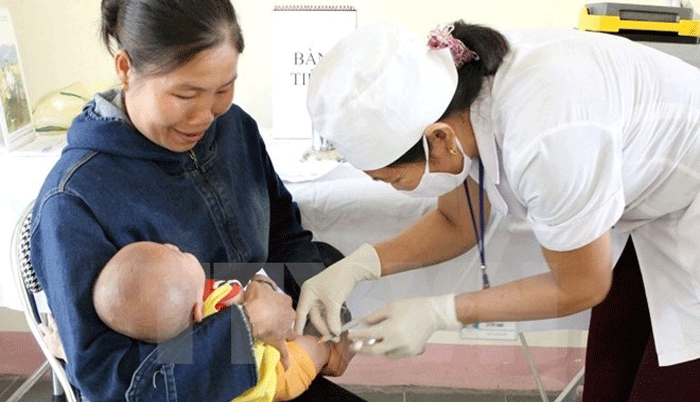![]() Home > Vietnam
Home > Vietnam
Low Hepatitis B Vaccination Rate In 22 Areas

A medical worker gives vaccination to a child. Only about 50-60 per cent of newborns across the country received the hepatitis B vaccination. – VNA/VNS Photo
![]() August 31st, 2016 | 07:26 AM |
August 31st, 2016 | 07:26 AM | ![]() 911 views
911 views
HÀ NỘI
Vaccination has covered only about half of newborns in Việt Nam, which makes experts worry as the country has the highest number of patients in the West Pacific region.
While the vaccination is effective, it has not reached the desired rate among newborns as only about 50-60 per cent of infants across the country receive the hepatitis B vaccination within two days of being born.
Dương Thị Hồng, deputy director of the National Institute of Hygiene and Epidemiology, said this at a conference organised by the Ministry of Health (MoH) yesterday in Hà Nội on preventing hepatitis caused by virus.
According to Hồng, in the first half of this year, 22 out of 63 provinces and cities across the country have 30 per cent of newborns receive the vaccine. Several provinces have only 11-12 per cent of newborns get the vaccination.
The national immunisation programme this year hoped to reach 75-80 per cent of newborns, which meant that some 36-40 per cent of the infants should have received the vaccine in the first half of the year, she said.
However, in 22 provinces and cities, including Sơn La, Cao Bằng, Điện Biên and Lạng Sơn, as well as Gia Lai, Nghệ An, Lai Châu and Quảng Bình, along with Bình Định, Hải Phòng and Bắc Giang, the success rate is under 30 per cent.
Hồng called the conditions alarming. He said the health sector hoped to raise the rate to 75 per cent.
Last year, the country’s average rate of receiving the hepatitis B vaccine was 69.8 per cent, and this was uneven in different localities.
Referring to the reasons for the low rate in some areas, Hồng said medical workers were worried about the after-effects of the vaccination, and so they hesitated.
In addition, several hospitals did not focus on the immunisation programme, while some mothers were afraid of the side-effects, and so chose not to give their newborns the injection, she said.
Dr Lokky Wai, World Health Organisation (WHO) representative in Việt Nam, said hepatitis in Việt Nam was worrying as the country had the highest number of patients in the West Pacific region.
At present, Việt Nam has some 8.7 million people affected by hepatitis B and one million others affected by hepatitis C, according to statistics revealed by the MoH, in co-ordination with the WHO.
The burden caused by hepatitis in Việt Nam was 40 times higher than that caused by HIV, Wai said.
The WHO has recommended that a combined treatment and prevention strategy could eliminate hepatitis B and C in 2030.
Preventive methods included injecting newborns with the hepatitis B vaccine within two days of being born, especially infants living in areas with a high risk of the disease, and controlling bacterial contamination inside and outside the medical stations. — VNS
Source:
courtesy of VIET NAM NEWS
by Viet Nam News
If you have any stories or news that you would like to share with the global online community, please feel free to share it with us by contacting us directly at [email protected]